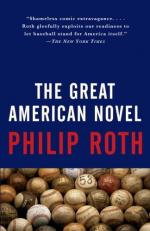|
This section contains 8,404 words (approx. 29 pages at 300 words per page) |

|
SOURCE: Greenberg, Robert M. “Transgression in the Fiction of Philip Roth.” Twentieth Century Literature 43, no. 4 (winter 1997): 487-506.
In the following essay, Greenberg examines the theme of transgression in Philip Roth's work, contending that the author's techniques are uniquely reflective of his relationship with mainstream American media and literary activity.
In The Anatomy Lesson (1983) Philip Roth provides an explanation for Nathan Zuckerman's involvement with transgression as a man and a writer. Roth describes first-generation immigrant fathers as “pioneering Jewish fathers bursting with taboos” who produce second-generation sons “boiling with temptations.” A page later he adds about his literary alter ego, “If it hadn't been for his father's frazzled nerves and rigid principles and narrow understanding, he'd never have been a writer at all,” “a second-generation American son possessed by … exorcism” of his father's “demons” (268-69). This intergenerational interpretation of the cultural origin of transgression in Roth's fiction illuminates the...
|
This section contains 8,404 words (approx. 29 pages at 300 words per page) |

|


